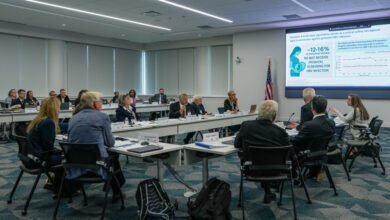RFK Jr. Advisers Drop MMRV Vaccine Recommendation in Controversial Move

▼ Summary
– Robert F. Kennedy Jr. replaced all 17 original ACIP members with seven new members who lack expertise and hold anti-vaccine views.
– The panel voted to remove the CDC’s recommendation for the MMRV combination vaccine for children under 4 years old.
– New members demonstrated inexperience by asking basic questions and making inaccurate claims during the meeting.
– The panel postponed a vote on the hepatitis B vaccine recommendation and will reconvene to discuss it and COVID-19 vaccines.
– The MMRV decision revisited an issue previously resolved by experts, despite current CDC guidelines recommending two doses for children.
A panel of vaccine advisors appointed by Robert F. Kennedy Jr. has voted to eliminate the long-standing federal recommendation for the MMRV combination vaccine in young children, a move that critics argue advances an anti-vaccine agenda and undermines public health policy. The controversial decision marks a significant departure from established immunization guidelines and has raised alarms among medical professionals.
The newly formed Advisory Committee on Immunization Practices (ACIP), which replaced a group of highly qualified experts earlier this year, decided to remove the Centers for Disease Control and Prevention’s endorsement of the measles, mumps, rubella, and varicella (MMRV) vaccine for children under four years old. This change comes despite decades of evidence supporting the vaccine’s safety and effectiveness in preventing serious childhood illnesses.
Earlier this summer, Kennedy dismissed all 17 members of the original ACIP panel, replacing them with seven individuals whose qualifications and impartiality have been widely questioned. Many of the new appointees lack specialized expertise in vaccinology or public health, and several have publicly expressed skepticism toward vaccines, including those developed for COVID-19. At least two members have previously served as paid expert witnesses in lawsuits against vaccine manufacturers, raising concerns about potential conflicts of interest. Kennedy later expanded the committee with five additional members who share similar controversial views.
During Thursday’s daylong meeting, the first of two scheduled sessions, committee members displayed a troubling lack of familiarity with fundamental aspects of vaccine science and policy. They repeatedly asked basic questions about research methodology and data interpretation, at one point requesting clarification on the meaning of a “low confidence” rating in scientific literature. At the same time, they criticized CDC presentations for omitting data that had, in fact, just been presented by agency scientists.
The meeting’s morning session centered on the MMRV vaccine, while the afternoon focused on whether to recommend a birth dose of the hepatitis B vaccine. A vote on the latter was postponed when the panel opted to revise the wording of the resolution. Discussions and a final vote on both the hepatitis B and updated COVID-19 vaccine recommendations are expected to continue on Friday.
The MMRV debate revisited a topic that had been extensively studied and resolved by previous expert panels. Current CDC guidelines advise that children receive two doses of vaccine protection against measles, mumps, rubella, and chickenpox, the first between 12 and 15 months of age, and the second between ages 4 and 6. The combination vaccine has been widely used to simplify immunization schedules and improve compliance.
(Source: Ars Technica)







